英语倒装句12种类型及例句
倒装句经典例句

倒装句经典例句一、部分倒装(部分倒装记忆口诀):不只让步也常需如此祝福1.never, seldom, rarely, little, hardly, no, not, nowhere, not a single+n, not until等含有否定意义的副词若位于句首,则其后要用部分倒装:※I have never participated in such an instructive activity before.=Never before have I participated in such an instructive activity.We are going nowhere at the weekend.=Nowhere are we going at the weekend.※Never shall I forget it.我永远不会忘记这件事。
He seldom comes late.他很少迟到.=Seldom does he come late.She hardly has time to listen to music. 她几乎没时间听音乐。
= Hardly does she have time to listen to music.She did not sing a single song at yesterday’s party.=Not a single song did she sing at yesterday’s party.※Not until I failed in the exam did I realize how much time I had wasted.(从句不倒主句倒)※Not until yesterday did I know the news.※Not until then did I know my senior high school life had really began.No word did he say before he left.他一句话没说就走了。
英语语法 倒装句有哪些常见的类型
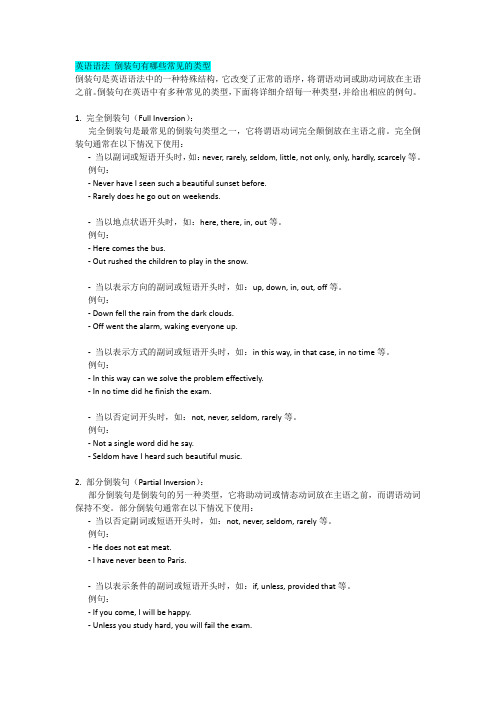
英语语法倒装句有哪些常见的类型倒装句是英语语法中的一种特殊结构,它改变了正常的语序,将谓语动词或助动词放在主语之前。
倒装句在英语中有多种常见的类型,下面将详细介绍每一种类型,并给出相应的例句。
1. 完全倒装句(Full Inversion):完全倒装句是最常见的倒装句类型之一,它将谓语动词完全颠倒放在主语之前。
完全倒装句通常在以下情况下使用:-当以副词或短语开头时,如:never, rarely, seldom, little, not only, only, hardly, scarcely等。
例句:- Never have I seen such a beautiful sunset before.- Rarely does he go out on weekends.-当以地点状语开头时,如:here, there, in, out等。
例句:- Here comes the bus.- Out rushed the children to play in the snow.-当以表示方向的副词或短语开头时,如:up, down, in, out, off等。
例句:- Down fell the rain from the dark clouds.- Off went the alarm, waking everyone up.-当以表示方式的副词或短语开头时,如:in this way, in that case, in no time等。
例句:- In this way can we solve the problem effectively.- In no time did he finish the exam.-当以否定词开头时,如:not, never, seldom, rarely等。
例句:- Not a single word did he say.- Seldom have I heard such beautiful music.2. 部分倒装句(Partial Inversion):部分倒装句是倒装句的另一种类型,它将助动词或情态动词放在主语之前,而谓语动词保持不变。
英语倒装句12种类型及例句
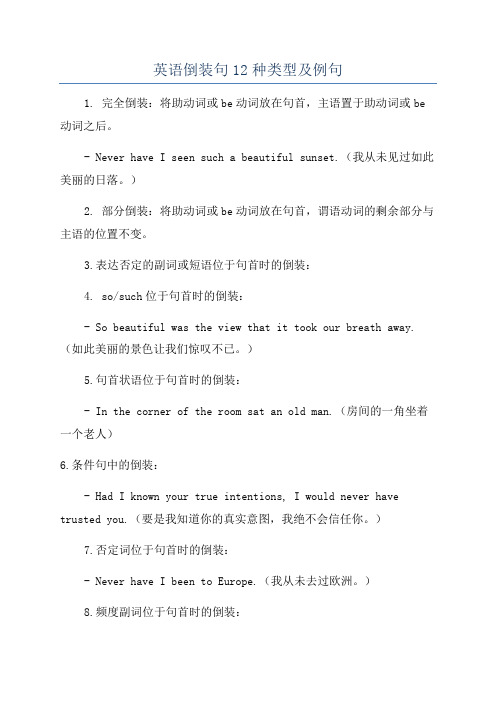
英语倒装句12种类型及例句1. 完全倒装:将助动词或be动词放在句首,主语置于助动词或be 动词之后。
- Never have I seen such a beautiful sunset.(我从未见过如此美丽的日落。
)2. 部分倒装:将助动词或be动词放在句首,谓语动词的剩余部分与主语的位置不变。
3.表达否定的副词或短语位于句首时的倒装:4. so/such位于句首时的倒装:- So beautiful was the view that it took our breath away.(如此美丽的景色让我们惊叹不已。
)5.句首状语位于句首时的倒装:- In the corner of the room sat an old man.(房间的一角坐着一个老人)6.条件句中的倒装:- Had I known your true intentions, I would never have trusted you.(要是我知道你的真实意图,我绝不会信任你。
)7.否定词位于句首时的倒装:- Never have I been to Europe.(我从未去过欧洲。
)8.频度副词位于句首时的倒装:- Rarely do we see such dedication.(我们很少见到如此的奉献精神。
)9.祈使句或祈使句部分的倒装:- Stand up!(站起来!)- Be quiet, please.(请安静。
)10. only位于句首时的倒装:- Only by working hard can you achieve your goals.(只有通过努力工作,你才能实现目标。
)11.地点状语置于句首时的倒装:- In the garden were beautiful flowers.(花园里有美丽的花朵。
)12.宾语置于句首时的倒装:- A love like this I have never felt before.(我之前从未感受过如此的爱。
英语倒装句(最全面_最简洁)
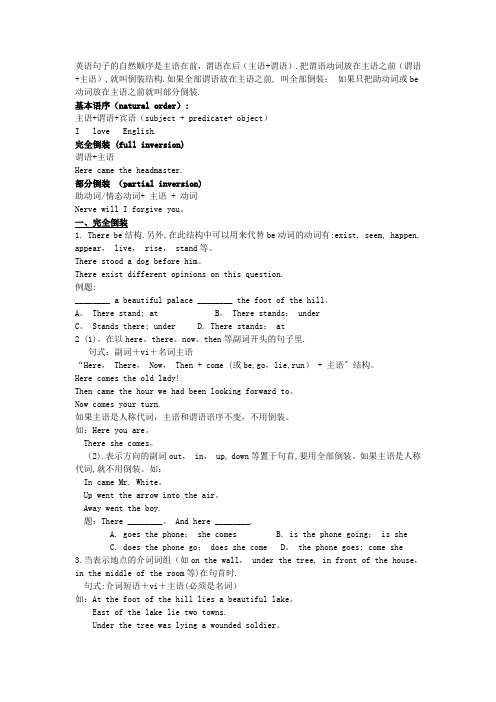
英语句子的自然顺序是主语在前,谓语在后(主语+谓语).把谓语动词放在主语之前(谓语+主语),就叫倒装结构.如果全部谓语放在主语之前, 叫全部倒装;如果只把助动词或be 动词放在主语之前就叫部分倒装.基本语序(natural order):主语+谓语+宾语(subject + predicate+ object)I love English.完全倒装 (full inversion)谓语+主语Here came the headmaster.部分倒装(partial inversion)助动词/情态动词+ 主语 + 动词Nerve will I forgive you。
一、完全倒装1. There be结构.另外,在此结构中可以用来代替be动词的动词有:exist, seem, happen, appear, live, rise, stand等。
There stood a dog before him。
There exist different opinions on this question.例题:________ a beautiful palace ________ the foot of the hill。
A。
There stand; at B。
There stands; underC。
Stands there; under D. There stands; at2 (1)。
在以here、there、now、then等副词开头的句子里.句式:副词+vi+名词主语“Here, There, Now, Then + come (或be,go,lie,run) + 主语" 结构。
Here comes the old lady!Then came the hour we had been looking forward to。
Now comes your turn.如果主语是人称代词,主语和谓语语序不变,不用倒装。
倒装句经典例句

倒装句经典例句倒装句经典例句一、部分倒装(部分倒装记忆口诀):不只让步也常需如此祝福1.never, seldom, rarely, little, hardly, no, not, nowhere, not a single+n, not until等含有否定意义的副词若位于句首,则其后要用部分倒装:※I have never participated in such an instructive activity before.=Never before have I participated in such an instructive activity.We are going nowhere at the weekend.=Nowhere are we going at the weekend.※Never shall I forget it.我永远不会忘记这件事。
He seldom comes late.他很少迟到.=Seldom does he come late.She hardly has time to listen to music. 她几乎没时间听音乐。
= Hardly does she have time to listen to music.She did not sing a single song at yesterday’s party.=Not a single song did she sing at yesterday’s party.※Not until I failed in the exam di d I realize how much time I had wasted.(从句不倒主句倒)※Not until yesterday did I know the news.※Not until then did I know my senior high school life had really began.No word did he say before he left.他一句话没说就走了。
英语中常见的12种倒装结构

英语中常见的12种倒装结构(1)多数疑问句都是倒装语序.例:Is this raincoat yours? 这件雨衣是你的吗?(2) there be 句型及其变体there live(stand,lie,appear,seem,remain,exist…..等) 中,按语法需要,谓语动词全部位于主语之前,成为倒装语序。
例:there is no longer a particular year in which one goes to work or gets married or starts a family.(美国)不再有一个特定的上学、工作、结婚或成家的年龄。
(3)省去if的虚拟条件从句要采用倒装语序。
例:Were it rain tomorrow , we would have to put off the visit to the Yangpu Bridge.如果明天下雨的话,我们只好推迟参观杨浦大桥。
(4)以so,neither,nor引起的表示和前面句子意思相同的句子用倒装语序。
例:he has been to Beijing.so have I.他去过北京。
我也去过北京。
(5)以here(或there,now,then等)开头且谓语动词是be(或com,go等)句子采用倒装语序。
例:Here are some advertisements about English language training from newspapers.这儿有几则选自报纸的关于英语语言培训的广告。
(6)as引导的让步状语从句用倒装语句。
例:clever as he is,he doesn’t study well.尽管他很聪明却不好好学习。
(7)直接引语前置,名词作引述句主语时用倒装语序。
例:“It is unbelievable!”said a from Guangdong province.一位来自广东的教师说:“这真叫人难以置信”(8) 某些表示愿望的感叹句要用倒装语序。
全面的倒装句总结
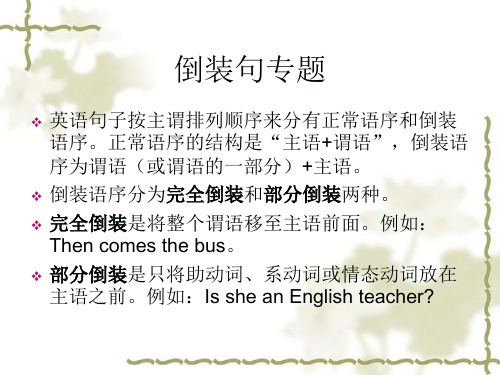
(二)含有否定意义的连词放句首: 含有否定意义的连词放句首 not only…but also.., neither.. nor.., no sooner…than..,scarely.. than.., hardly.. when.., not until... 注意: 注意 1) not until 引出主从复合句,主句倒装, 主句倒装, 主句倒装 从句不倒装。 从句不倒装 2)not only, no sooner,hardly,scarely 要倒, but (also),than, when后面的句 子不倒。 3)neither...nor..两部分都倒装。
(七)虚拟条件句的倒装 虚拟条件句的倒装 虚拟条件句的从句部分如果含有 were, should, 或 had, 可将 if 省略,再把 were, should 或 had 移到从句句首,实行倒装 。 ---Were they here now,they could help us. =If they were here now, they could help us. ----Had you come earlier,you would have met him =If you had come earlier, you would have met him. ---Should it rain,the crops would be saved. =Were it to rain,the crops would be saved.
---Oh,yes. Has the teacher come yet? ---Look! Here________. A the bell goes, is he coming B goes the bell, he comes C the bell is going, he is coming D goes the bell, comes he
英语倒装句归纳

英语倒装句归纳 Share classic historical materials英语倒装句的用法类型1)部分倒装——助动词\情态动词+主语+谓语的实义动词型2)全倒装——谓语+主语型一、在以下结构中用全倒装:这种结构通常只用于一般现在时和一般过去时..常见的结构有:1.在there be或者There livestand;appear.seem;remain;exist…. 句型中;如:There are thousands of people on the square. 原语序:Thousands of people are there on the square.There lived an old fisherman in the village. 原语序:An old fisherman lived there in the village.There stands a little girl. 正常语序:A little girl stands there.2.在“here; there; now; thus; then+动词+主语”的句子中;谓语动词为be; go;come; lie; run等;主语为名词;Now comes my turn. There goes the bell. Then came the order to leave. Here comes a bus= A bus comes here.3.在“out\ in; up\ down; off\away;in the distance;on the hill;round the corner”等表示方向性的副词或表示地点的介词词组位于句首;且主语又是名词;谓语是表示运动的动词..Away went the crowed one by one. In came a stranger in black.Out rushed the children.. Down fell the leaves. On the floor were pilesof old books.☆注意:主语必须是名词eg: Out she went.There they are. Here he comes. 而Out went the girl. Here comes the boy.4.有时为了强调表语;构成“表语+连系动词+主语”结构;Lucky is she who was chosen to be a leader.=She who was chosen to be a leader is lucky.Gone are the days when women were looked down upon =The days when women were looked down upon are gone5、在某些表示愿望的祝愿语中;全倒装..Long live the People's Republic of China May you be happy二、在以下结构中用部分倒装部分倒装是指将谓语的一部分如助动词或情态倒装至主语之前..如果句中的谓语没有助动词或情态动词;则需添加助动词do; does或did;并将其置于主语之前..1.含有否定或半否定意义的词语如:not;never;seldom;hardly;little;scarcely;barely;few…;或者含有否定结构的连词not only…but also..; neither..nor..; no sooner had…than...一......就......; scarely..than..; Hardly had ...when..; not until...;nowhere等;或否定意义的介词词组by no means决不;in no case\way任何情况下都不;with no method; at no time决不; on no account决不;under no circumstances\condition...任何情况下都不位于句首eg: I have never seen him before.=Never have I seen him before.Not a word did he say when he left. Seldom/Scarecely does he go to that park.Hardly几乎不...... do I speak to him. Little English can he speak.Little does he realize the importance of the meeting. Few people did I see in the street.含有否定结构的连词:eg:1Not only can he play basketball; but also I can.2No sooner had we arrived home than it began to rain.3Hardly had we met our friends when the train left.4Not until the baby fell asleep did the mother leave the room.主句倒装;从句不倒装=The mother didn’t leave the room until the baby fell asleep.注意:1Not only...but also...必须连接两个分句时;才使用部分倒装..而且只倒装not only后的分句..如果连接的是两个并列词语;不用倒装结构..如:Not only his father but also I like reading.2Hardly...when...; Scarcely...than...; No sooner...than...意义基本相同;它们连接的句子;都只倒装前一个分句;即:“前倒后不倒装”..3当not until直到......才引导主从复合句时;主句倒装;从句不用倒装;或者可以理解为:“后倒前不倒装”..含有否定意义的介词词组:如:By no means should we tell lies. On no account should we let him leave.At no time决不will I get married to you. In Under no circumstances will I lend money to him.注意:in no time立即;马上位于句首时;其后无需用倒装语序:In no time he worked out the problem. 他马上就算出了那道题..2.only+副词;或介词短语;或状语从句时;主句倒装;eg: Only in this way can you use the computer well. only+介词短语Only yesterday did he find out that his watch was missing.only+副词Only when it began to rain did he finish his job.only+状语从句3.so用在句首;表示另一主语“也......样”时;用“So + behave;助动词或情态动词+主语”结构;而表示另一主语“也不......样”时;用“Nor\Neither + behave;助动词或情态动词+主语”结构;注意:若是对上文同一主语的情况进行强调时;不倒装..句型为“So+主语+be或dodid/have ”..He went to school yesterday; so did I.---David has made great progress recently. --So he has; and so have you.He hasn't finished his homework; and nor have I. 特别注意:If you won't go; neither/nor will I.4.as 作“尽管/虽然”;引导让步状语从句as可以换成though;由于语法需要;需要部分倒装..Shortest as/though she is; she is not the fattest.倒装后;最高级前不用冠词Child as he is; he knows a lot.倒装后;单数名词前不用aFail as I did; I would try again.倒装后;实义动词提前;在主语后添加助动词.. Hard as he tried; he didn't pass the exam.副词提到句首注意:though位于句首引导让步状语从句时;可以倒装;也可以不倒装..但as引导让步状语从句时;必须使用倒装..否则就变成了原因状语从句..eg:As he is too young; he couldn't go to school.5.在”so…that…”和”such…that…”引导的结果状语从句中;当so和such位于句首时;用”so\such + ... +部分谓语+ 主语+...”;So difficult was the exam that most of the students failed to pass it.=The exam was so difficult that most of the students failed to pass it.6.若if 引导的虚拟条件句中有were; had; should 时; 可将if省略;把were; had ; should 放在句首..1)Should it rain tomorrow; we would not play basketball.=If it should rain tomorrow; we would not play basketball.2Had I prepared well; I couldn't have lost the job.=If I had prepared well; I couldn't have lost the job.3 Were he to come tomorrow; I would go to meet him at the airport.=If he were to come tomorrow; I would go to meet him at the airport.倒装句练习题1. Not until I began to work ____ how much time I had wasted.A. didn't I realizeB. did I realizeC. I didn't realizeD. I realized2. Only by practising a few hours every day ____ be able to master the language.A. you canB. can youC. you willD. will you3. If you don't go; neither ____.A. shall I B. do I C. I do D. I shall4. No sooner ____ to the station ____ the train left.A. had I got; whenB. I had got; thanC. had I got; thanD. didI get; when5. — Your father is very strict with you. —_____ He never lets off a single mistake of ours.A. So he isB. So is heC. He is soD. So does he6. ____ today; he would get there by Sunday.A. Would he leaveB. Was he leavingC. Were he to leaveD. If he leave7. Never in my life ____ such a thing.A. I have heard or have seenB. have I heard or seenC. I have heard or seenD. did I hear or see8. —— Here ____ Where is Xiao LiuThere ____.A. comes the bus; is heB. comes the bus; he isC. the bus comes; is heD. the bus comes; he is9. ____ ;I will not buy it.A. Much as do I like itB. As much I like itC. Much as I like itD. As I like it much10. —— I like football. I don't like volleyball. ____.A. So do IB. Neither do IC. So it is with meD. So is it with me11. _____ the expense; I _____ to Italy.A. If it were not; goB. Were it not for\would goC. Weren't it for\will goD. If it hadn't been\would have gone12. So _____ in the darkness that he didn't dare to move an inch.A. he was frightenedB. was he frightenedC. frightened he wasD. frightened was he13. -- In modem times; girls like beautiful clothes.--Yes; _____ and_____ After all; our life has greatly improved.A. so do they; so do youB. so they do; so you doC. so do they; so you doD. so they do; so do you14. —— You have an English class every day except Sunday. _____.A. So we haveB. So we doC. So have weD. So do we15. I wonder if your wife will go to the ball. If your wife _____; so_____ mine.A. does; willB. will; doesC. will; wouldD. does; do16. Only after I read the text over again _____ its main idea.A. that I knewB. did I knewC. 1 could knowD. I did know17--You seem to have learned all the English words by heart. -- _____ .A. So l doB. So do lC. So I haveD. So have I18. -- I seldom watch TV; but listen to the radio a lot. --_____ .A. So do IB. Neither do IC. I m the sameD. So it is with me19. So excited _____ that he couldn't say a word.A. he seemedB. did he seemC. was he seemingD. he did look20. Jimmy was so nervous not a single word _____ down in the dictation.A. he wroteB. he was writtenC. did he writeD. was he written21. Little ______ when 1 took the trip where it would lead me.A. have I knownB. had I knownC. do 1 knowD. did I know22. -- Have you ever seen anything like that before---- ____.A. No; I never have seen anything like that beforeB. No; never I have seen anything like that beforeC. No; never have 1 seen anything like that beforeD. No; I have seen anything like that before never23. _____ ;1 would accept the invitation and go to the party.A. Were I youB. Was I youC. Had I been youD. Would 1 be you24. You should work less _____.A. and neither should IB. and so should IC. and nor should ID. and so I should25. _____ and caught the mouse.A. Up the cat jumpedB. The cat up jumpedC. Up jumped the catD. Jumped up the cat26. Not only _____ a promise; but also he kept it.A. did he makeB. he madeC. does he makeD. has he made27. His uncle is a worker and has been working in the factory for more than ten years. _____.A. So is his auntB. So has his auntC. So his aunt doesD. Soit is with his aunt28. Not once _____ their plan.A. did they changeB. they changedC. changed theyD. they did change29. -- Do you know Jim quarreled with his brother-- I don't know; and______ .A. nor don't I careB. nor do I careC. I don't care neitherD. Idon't care also30. Not until he arrived home _____ he find that this wallet had been stolen.A. didB. wouldC. whenD. that31. --This is one of the oldest trees in the world. _____ such a big tree.A. Never I have seenB. I haven't never seenC. Never have I seenD. I have seen never32. Nowhere else in the world _____ cheaper tailoring裁缝业;成衣业thanin Hong Kong.A. a tourist can findB. can a tourist findC. a tourist will findD.a tourist has found33._____ succeed in doing anything.A. Only by working hard we canB. By only working hard we canC. Only we can by working hardD. Only by working hard can we34._____ that we all went out; lying in the sun.A. So fine was the weatherB. So was the fine weatherC. The weather was so fine wasD. So the weather was tine35. ____ a nice man ____ that we all believe him.A. So; did he seemB. So; he seemedC. Such; he seemedD. Such; did he seem36. --You seem to be an actor. --___ . I have played many parts in alot of films.A. So do IB. So am IC. So I doD. So I am37. Not only ____ working hard; but also ____ very polite.A. the boy is; he isB. is the boy; he isC. the boy is; is heD. is the boy; is he38. ____; he never seems able to do the work beautifully.A. Try as he doesB. As he triesC. Try as does heD. As try he does39.-- I cannot see the picture well from here.---- _____.A. Neither can t IB. Neither I canC. I can't neitherD.Neither can I40.--You ought to have given them some advice ---- _____; but who cared what I askedA. So ought youB. So 1 oughtC. So it wasD. So I did41. So carelessly _____ that he almost killed himself.A. he drivesB. does he driveC. did he driveD. he drove42. Little _____ about his own health though he was very ill.A. he caredB. did he careC. he caresD. does he care43. Well ____ know him and well ____ know me.A. I did; he didB. did I; he didC. did I; did heD. I did; did he44. No sooner ____ they rushed out into the street.A. did they hear the news thanB. did they hear the news whenC. had they heard the news thanD. had they heard the news when45. Little wonder _____ up their hands in dismay.A. have some thrownB. some have thrownC. thrown some haveD. have thrown some46. ____; he would have passed the exam. A. If he were to studyB. If he studied hardC. Had he studied hardD. Should he study hard47. We were lucky enough; for no sooner _____ home _____ it rained.A. we returned; andB. we had returned; whenC. did we return; whenD. had we returned; than48. So little _____ agree on the plan that they could not settle their difference.A. did theyB. do theyC. they didD. they did not49. _____ he realized it was too late to return home.A. No sooner it grew dark thanB. Hardly did it grow dark whenC. It was not until dark thatD. It was until dark that参考答案1~5 BDACA 6~10 CBBCC 11~15 BDDBA 16~20 BADBC 21~25 DCABC 26~30 ADABA 31~35 CBDAD 36~40 DBADD 41~45 CBCCB 46~49 CDAC。
(完整版)高中英语“倒装句”的12种用法
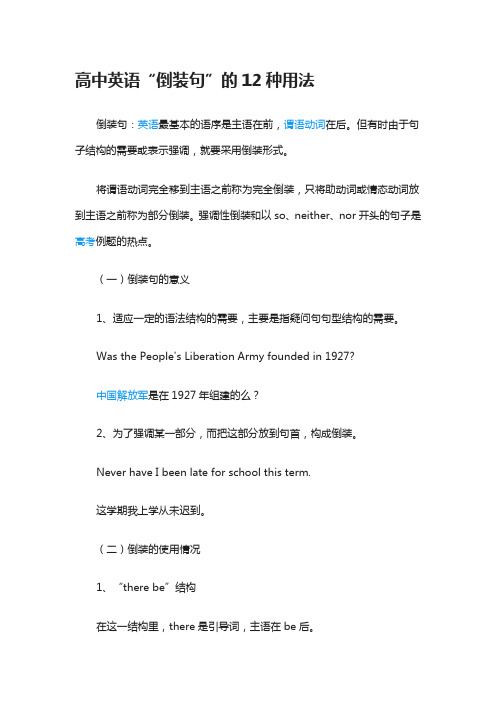
高中英语“倒装句”的12种用法倒装句:英语最基本的语序是主语在前,谓语动词在后。
但有时由于句子结构的需要或表示强调,就要采用倒装形式。
将谓语动词完全移到主语之前称为完全倒装,只将助动词或情态动词放到主语之前称为部分倒装。
强调性倒装和以so、neither、nor开头的句子是高考例题的热点。
(一)倒装句的意义1、适应一定的语法结构的需要,主要是指疑问句句型结构的需要。
Was the People's Liberation Army founded in 1927?中国解放军是在1927年组建的么?2、为了强调某一部分,而把这部分放到句首,构成倒装。
Never have I been late for school this term.这学期我上学从未迟到。
(二)倒装的使用情况1、“there be”结构在这一结构里,there是引导词,主语在be后。
There is a box on the table.桌子上有个盒子。
2、疑问句疑问句为倒装形式。
Is she singing in the classroom?她是不是正在教室里唱歌?3、here、there等副词开头的句子(部分)在here、there等副词开头的某些句子中(要用一般现在时态)(前两个例句);如果主语是人称代词,主语和主要动词的词序不变。
(完全倒装)(最后一个例句)There goes the bell.铃响了。
Here is an apple for you.这个苹果给你。
There she comes.她来了。
4、重复倒装句型在以so、nor、neither开头,表示谓语所述的情况也适用于另一个人或一事物的肯定或否定句中。
so用于肯定句,表示“也一样”、“也这样”;nor、neither用于否定句,表示“同样也不,也不这样”。
I am watching TV. So is she.我在看电视,她也是。
My parents didn't watch TV last night. Neither (Nor) did I.我父母昨晚没有看电视,我也没看。
高中 英语 倒装句用法归纳
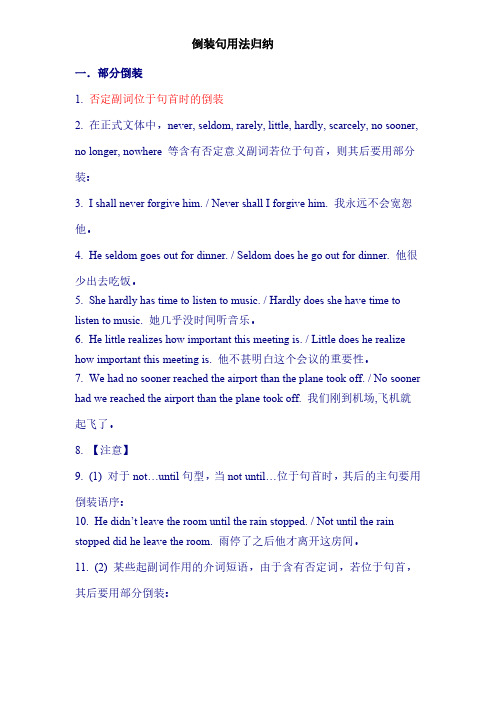
一.部分倒装1.否定副词位于句首时的倒装2.在正式文体中,never,seldom,rarely,little,hardly,scarcely,no sooner, no longer,nowhere等含有否定意义副词若位于句首,则其后要用部分装:3.I shall never forgive him./Never shall I forgive him.我永远不会宽恕他。
4.He seldom goes out for dinner./Seldom does he go out for dinner.他很少出去吃饭。
5.She hardly has time to listen to music./Hardly does she have time to listen to music.她几乎没时间听音乐。
6.He little realizes how important this meeting is./Little does he realize how important this meeting is.他不甚明白这个会议的重要性。
7.We had no sooner reached the airport than the plane took off./No sooner had we reached the airport than the plane took off.我们刚到机场,飞机就起飞了。
8.【注意】9.(1)对于not…until句型,当not until…位于句首时,其后的主句要用倒装语序:10.He didn’t leave the room until the rain stopped./Not until the rain stopped did he leave the room.雨停了之后他才离开这房间。
11.(2)某些起副词作用的介词短语,由于含有否定词,若位于句首,其后要用部分倒装:12.On no accounts must this switch be touched.这个开关是绝不能触摸的。
高考英语语法---倒装句常见的几种类型+经典例句
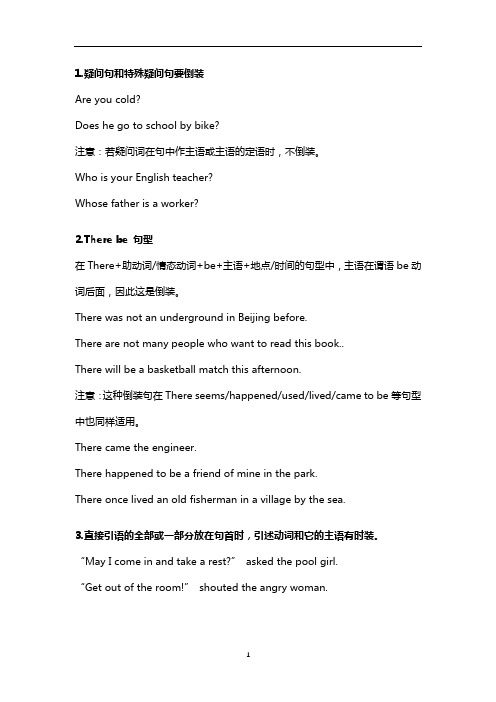
1.疑问句和特殊疑问句要倒装Are you cold?Does he go to school by bike?注意:若疑问词在句中作主语或主语的定语时,不倒装。
Who is your English teacher?Whose father is a worker?2.There be 句型在There+助动词/情态动词+be+主语+地点/时间的句型中,主语在谓语be动词后面,因此这是倒装。
There was not an underground in Beijing before.There are not many people who want to read this book..There will be a basketball match this afternoon.注意:这种倒装句在There seems/happened/used/lived/came to be等句型中也同样适用。
There came the engineer.There happened to be a friend of mine in the park.There once lived an old fisherman in a village by the sea.3.直接引语的全部或一部分放在句首时,引述动词和它的主语有时装。
“May I come in and take a rest?”asked the pool girl.“Get out of the room!”shouted the angry woman.4.以here, there, now, in ,out, up, down, away, then等副词开头的句子中,句子要倒装,以示强调。
习惯上,除以then开头的句子用过去时外,其余一般使用现在时。
There goes the bell.铃声响了。
There comes the bus! 汽车来了。
高中英语知识点归纳倒装句的分类与用法

高中英语知识点归纳倒装句的分类与用法倒装句是高中英语语法中的一个重要知识点。
它是指将谓语动词放在主语之前的结构,通过改变语序来达到强调或者修辞的目的。
在学习倒装句时,了解其分类和用法对于理解和运用倒装句至关重要。
一、完全倒装句完全倒装句是指将助动词、情态动词或be动词放在主语之前,构成倒装结构。
例如:1. Not only did he pass the exam, but he also got the highest score.不仅他通过了考试,而且还得到了最高分。
2. Rarely have I seen such a beautiful sunset.我很少见到如此美丽的日落。
3. Never before had I tasted such delicious food.我之前从未尝过如此美味的食物。
二、部分倒装句部分倒装句是指将助动词、情态动词或be动词放在动词之前,而不改变主语的位置。
例如:1. He can not only play the piano, but also sing well.他不仅会弹钢琴,而且唱得很好。
2. He is never late for class.他上课从不迟到。
3. They will definitely complete the project on time.他们一定会按时完成这个项目。
三、否定副词位于句首的倒装句当否定副词或者短语位于句首时,要将助动词、情态动词或be动词放在主语之前,构成倒装结构。
例如:1. Hardly had I left the house when it started to rain.我刚离开房子,天就下起雨来。
2. Seldom do we see her smile.我们很少看到她微笑。
3. On no account should you give up.无论如何你都不应该放弃。
四、状语位于句首的倒装句当状语(时间、地点、方式、原因等)位于句首时,要将助动词、情态动词或be动词放在主语之前,构成倒装结构。
英语倒装句的用法及举例

主语和谓语是句子的核心,它们之间有两种语序:一是主语在谓语之前称为自然语(Natural Order);二是主语在谓语之后则称为倒装语序(Inverted Order)。
而倒装语序中又有全部倒(Full Inversion)和部分倒装(Partial Inversion)两种情况。
1. 倒装句之全部倒装全部倒装是只将句子中的谓语动词全部置于主语之前。
此结构通常只用与一般现在时和一般过去时。
常见的结构有:1) here, there, now, then,等副词置于句首, 谓语动词常用be, come, go, lie, run。
There goes the bell.Then_________________.老师来了。
Now ________________.现在轮到你了。
2)地点状语置于句首,谓语表示运动的动词。
___________________________________________________________________________________ ___________________________________________________________________________________ _________________他来了。
_________________ 她们走出去了。
______________________2. 倒装句之部分倒装部分倒装是指将谓语的一部分如助动词或情态倒装至主语之前。
如果句中的谓语没有助动词或情态动词,则需添加助动词do, does或did,并将其置于主语之前。
1) 句首为否定或半否定的词语,如no, not, never, seldom, little, hardly, at no time, in no way, notuntil… 等Never_____________such a performance. 我从未见过如此好的表演。
英语中全倒装句子
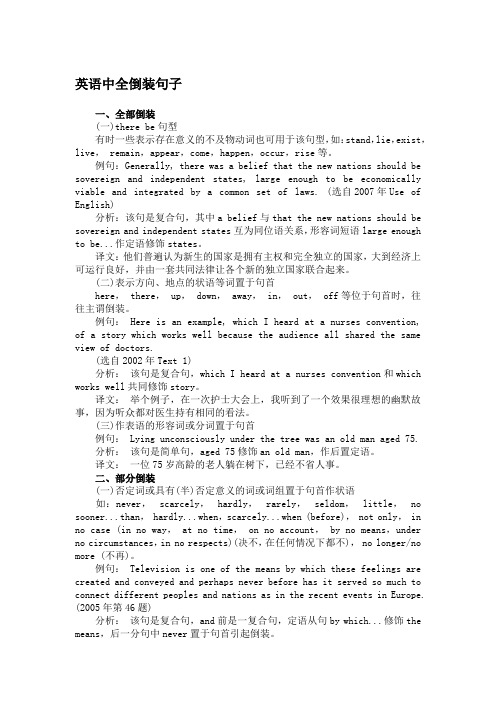
英语中全倒装句子一、全部倒装(一)there be句型有时一些表示存在意义的不及物动词也可用于该句型,如:stand,lie,exist,live, remain,appear,come,happen,occur,rise等。
例句:Generally, there was a belief that the new nations should be sovereign and independent states, large enough to be economically viable and integrated by a common set of laws. (选自2007年Use of English)分析:该句是复合句,其中a belief与that the new nations should be sovereign and independent states互为同位语关系,形容词短语large enough to be...作定语修饰states。
译文:他们普遍认为新生的国家是拥有主权和完全独立的国家,大到经济上可运行良好,并由一套共同法律让各个新的独立国家联合起来。
(二)表示方向、地点的状语等词置于句首here, there, up, down, away, in, out, off等位于句首时,往往主谓倒装。
例句: Here is an example, which I heard at a nurses convention, of a story which works well because the audience all shared the same view of doctors.(选自2002年Text 1)分析:该句是复合句,which I heard at a nurses convention和which works well共同修饰story。
高中英语 倒装例句练习及答案
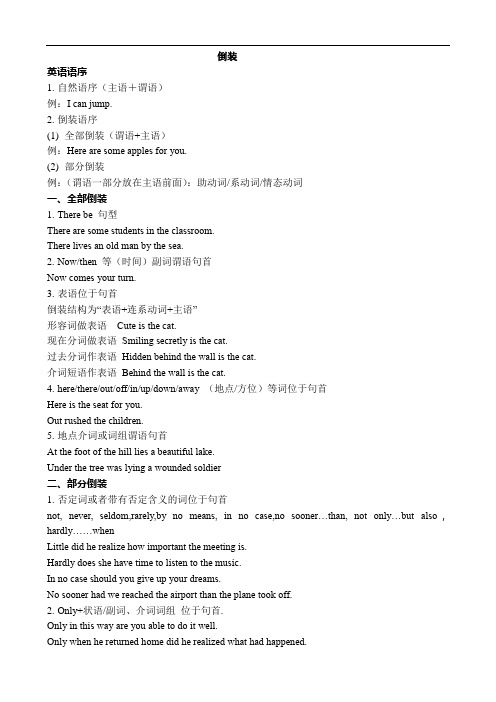
倒装英语语序1.自然语序(主语+谓语)例:I can jump.2.倒装语序(1)全部倒装(谓语+主语)例:Here are some apples for you.(2)部分倒装例:(谓语一部分放在主语前面):助动词/系动词/情态动词一、全部倒装1.There be 句型There are some students in the classroom.There lives an old man by the sea.2.Now/then 等(时间)副词谓语句首Now comes your turn.3.表语位于句首倒装结构为“表语+连系动词+主语”形容词做表语Cute is the cat.现在分词做表语Smiling secretly is the cat.过去分词作表语Hidden behind the wall is the cat.介词短语作表语Behind the wall is the cat.4.here/there/out/off/in/up/down/away (地点/方位)等词位于句首Here is the seat for you.Out rushed the children.5.地点介词或词组谓语句首At the foot of the hill lies a beautiful lake.Under the tree was lying a wounded soldier二、部分倒装1.否定词或者带有否定含义的词位于句首not, never, seldom,rarely,by no means, in no case,no sooner…than, not only…but also,hardly……whenLittle did he realize how important the meeting is.Hardly does she have time to listen to the music.In no case should you give up your dreams.No sooner had we reached the airport than the plane took off.2.Only+状语/副词、介词词组位于句首.Only in this way are you able to do it well.Only when he returned home did he realized what had happened.3.As 引导的让步状语,把需要的部分提前Child as he is, he has learned a lot.Girl as she was, she was very brave.(名词前无冠词)4."so/nor/neither"+助动词/情态动词/系动词+主语前面说过的情况也适用于另一个人或者物。
英语倒装句12种类型
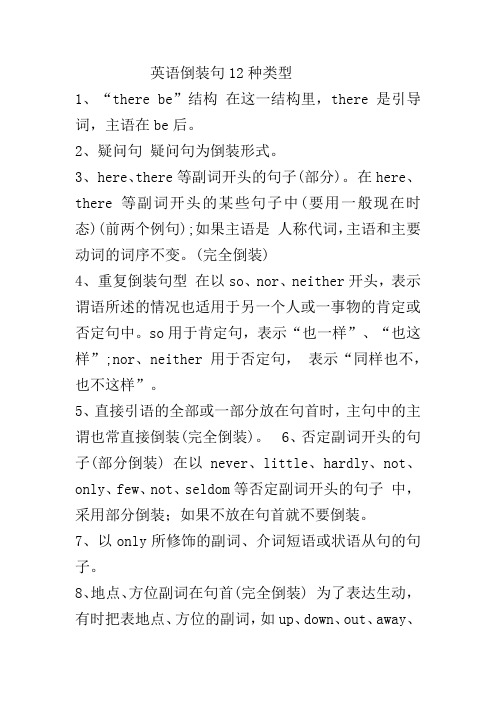
英语倒装句12种类型1、“there be”结构在这一结构里,there是引导词,主语在be后。
2、疑问句疑问句为倒装形式。
3、here、there等副词开头的句子(部分)。
在here、there等副词开头的某些句子中(要用一般现在时态)(前两个例句);如果主语是人称代词,主语和主要动词的词序不变。
(完全倒装)4、重复倒装句型在以so、nor、neither开头,表示谓语所述的情况也适用于另一个人或一事物的肯定或否定句中。
so用于肯定句,表示“也一样”、“也这样”;nor、neither用于否定句,表示“同样也不,也不这样”。
5、直接引语的全部或一部分放在句首时,主句中的主谓也常直接倒装(完全倒装)。
6、否定副词开头的句子(部分倒装) 在以never、little、hardly、not、only、few、not、seldom等否定副词开头的句子中,采用部分倒装;如果不放在句首就不要倒装。
7、以only所修饰的副词、介词短语或状语从句的句子。
8、地点、方位副词在句首(完全倒装) 为了表达生动,有时把表地点、方位的副词,如up、down、out、away、in等放在句首,同时把谓语动词放在主语之前。
若主语为人称代词,主语和谓语动词的位置不变,只将副词放在句首。
(完全倒装)9、虚拟结构中在虚拟结构中,条件从句的谓语含有were、had和should这三个词是,可省去if,将这些词移至主语之前。
10、as引导的让步状语从句 as引导让步状语从句时要倒装(形容词/副词/名词/动词+as+主语+谓语)。
11、祝愿的句子用于某些表示祝愿的句子里。
12、So+形容词、副词及such置于句首时。
详解英语倒装句的各种句式及用法,看完一遍掌握全部
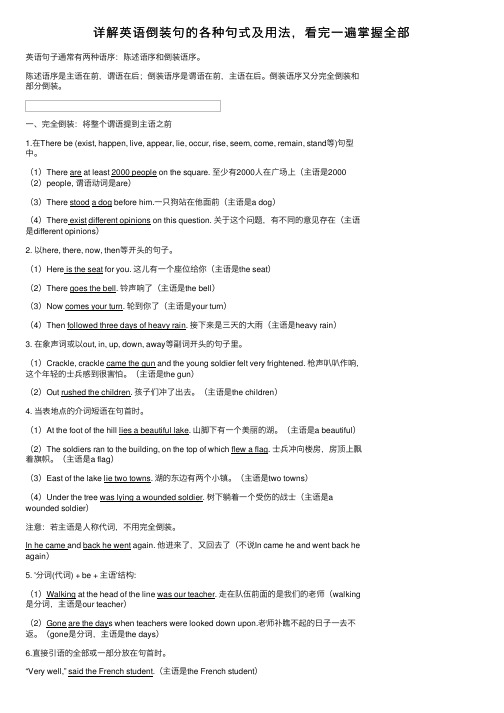
详解英语倒装句的各种句式及⽤法,看完⼀遍掌握全部英语句⼦通常有两种语序:陈述语序和倒装语序。
陈述语序是主语在前,谓语在后;倒装语序是谓语在前,主语在后。
倒装语序⼜分完全倒装和部分倒装。
⼀、完全倒装:将整个谓语提到主语之前1.在There be (exist, happen, live, appear, lie, occur, rise, seem, come, remain, stand等)句型中。
(1)There are at least 2000 people on the square. ⾄少有2000⼈在⼴场上(主语是2000(2)people, 谓语动词是are)(3)There stood a dog before him.⼀只狗站在他⾯前(主语是a dog)(4)There exist different opinions on this question. 关于这个问题,有不同的意见存在(主语是different opinions)2. 以here, there, now, then等开头的句⼦。
(1)Here is the seat for you. 这⼉有⼀个座位给你(主语是the seat)(2)There goes the bell. 铃声响了(主语是the bell)(3)Now comes your turn. 轮到你了(主语是your turn)(4)Then followed three days of heavy rain. 接下来是三天的⼤⾬(主语是heavy rain)3. 在象声词或以out, in, up, down, away等副词开头的句⼦⾥。
(1)Crackle, crackle came the gun and the young soldier felt very frightened. 枪声叭叭作响,这个年轻的⼠兵感到很害怕。
(主语是the gun)(2)Out rushed the children. 孩⼦们冲了出去。
- 1、下载文档前请自行甄别文档内容的完整性,平台不提供额外的编辑、内容补充、找答案等附加服务。
- 2、"仅部分预览"的文档,不可在线预览部分如存在完整性等问题,可反馈申请退款(可完整预览的文档不适用该条件!)。
- 3、如文档侵犯您的权益,请联系客服反馈,我们会尽快为您处理(人工客服工作时间:9:00-18:30)。
英语倒装句12种类型及例句
1.完全倒装句:
例句: "On the table lies a book."
2.部分倒装句(以介词短语、副词或副词短语开头):
例句: "In the garden runs a little girl."
3.否定副词或副词短语位于句首:
例句: "Never have I seen such a beautiful sunset."
4. 半倒装句(助动词、情态动词或be动词位于主语之前):
5.倒装的祈使句(动词原形+主语):
例句: "Go clean your room."
6. only位于句首:
例句: "Only in her dreams did she see herself as a successful writer."
7. so位于句首:
例句: "So beautiful was the view that it took my breath away."
8. neither/nor位于句首:
例句: "Neither did she attend the concert, nor did I."
9.如果状语从句放在句首:
10.条件从句位于句首:
例句: "Should he fail the exam, he will have to retake the course."
11.介词短语或副词短语位于句首:
例句: "In the corner sat a small dog."
12. or/ nor引导的短语或句子位于句首:。
